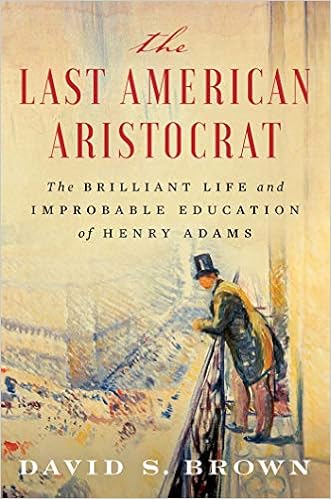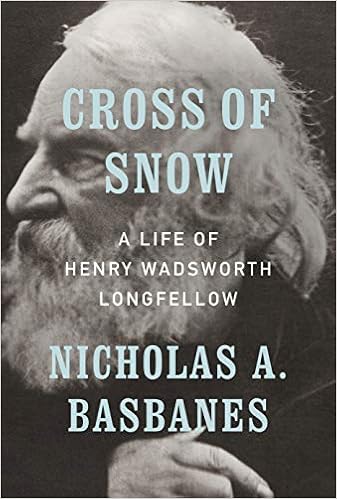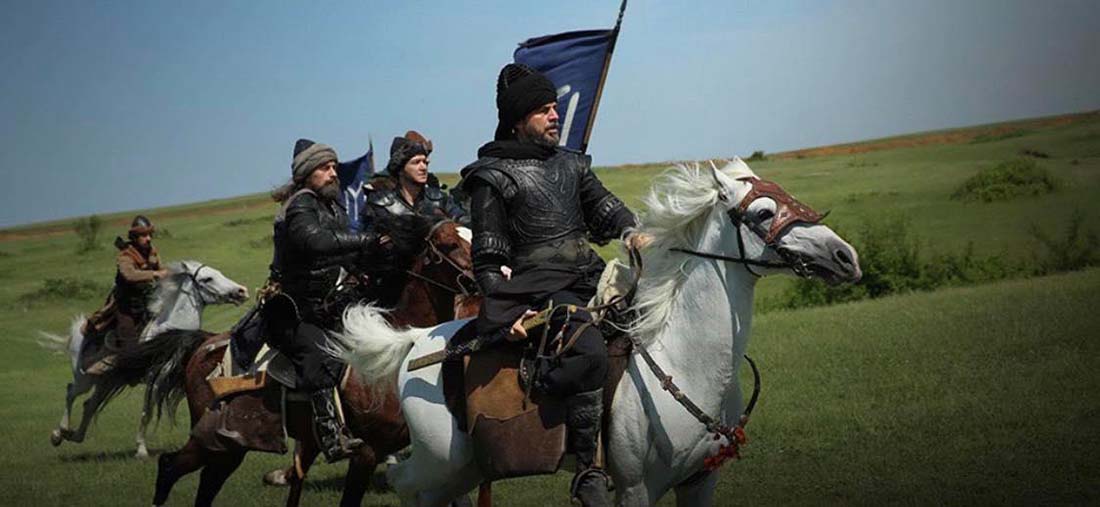. . . . Ordered a newly published book today, first in quite a while; I'd put a hold on it from the NYPL, but it is still on order and there are 18 holds ahead of mine, so I gave in to temptation: The Last American Aristocrat: The Brilliant Life and Improbable Education of Henry Adams by David S. Brown.
The Last American Aristocrat,” a new biography by David S. Brown, “reveals how dynastic burden shaped the personality and career of the brilliant, bitter and thoroughly unlikable man who brought the prominence of the Adams family, and expectations for the endurance of political legacies, to an ignominious end.
Plus, how strongly Henry Adams despised and resented President Grant! Gore Vidal went right along with that, lifting (almost) entire paragraphs from Adams's presentation of Grant, in his novel, 1876. (Yes, Henry and Gore shared unlimited reservoirs of vitriole, malice and envy of others' successes.)
This pairs nicely with the just finished, frustrating, This Vast Southern Empire: Slaveholders At the Helm of American Foreign Policy (2016) by Marthew Karp. Karp quotes Adams frequently throughout.
Brown's Last Aristocrat will go equally well with my most recent biography of a 19th century New England aristocrat, The Civil Wars of Juliet Ward Howe (2016) by Elaine Showalter. Never mind that Julia Ward was from New York City, known both as "the Diva" and "the Belle" of her generation of wealthy heiresses. She foolishly married Samuel Gridley Howe, a Bostonian, and suffered for that until he died. In fact, Howe didn't even live in Boston per se, but South Boston, surrounded by rough, laboring sorts, that was two and half miles away from anyone in their own social circles. Despite his intimate relationship with Charles Sumner, one of the most famous of Abolitionists, he didn't even like Julia participating in that movement. Already, during their honeymoon, Julia concluded Howe should have married Sumner, as "she" was more suited to him than she was.
Howe, an intimate of the intimate circles around Henry Wadsworth Longfellow, which included Sumner, kept the future author of "The Battle Hymn of the Republic" fairly locked up in his school school quarters for his Perkins Institution, the first school for the blind and deaf in the US. He believed with every fiber of his being that women were only wives and mothers, and had no desire for doing anything else except caring for her family -- and certainly no desire for sex or sexual feelings at all, much less a desire for personal fulfillment in work. In fact, this much older husband, was remarkably like Julia's vastly wealthy banker father, whose more than handsome legacy to his daughter Howe busied himself in losing as fast as possible. Hawthorne and Longfellow, and Sumner too -- and so did William Wordsworth -- thought Julia was 'forward' and heartily disapproved of her having opinions and speaking them.
Julia's husband, Samuel Gridley Howe, was as wrong a husband for her -- or just about any woman as could be. He even (unlike Longfellow) objected to women using ether to escape the dreadful, prolonged agony of child birth. He was as wrong for Julia as Henry Adams was the wrong husband for Clover (and would have been for just about any woman). But Julia was of sterner stuff than Marian 'Clover' Hooper Adams. Julia persisted. She did not kill herself. She did become famous in the public sphere. and she outlived the appalling, Samuel Gridley Howe, with a reputation in U.S. history at least as well-known as his.
~~~~~~~~~
When it comes to watching, some nights, as briefly as it happens in my dreams too, I soar and fly! There are scenes in Nirvana In Fire episodes in which martial artists from the Pugilist World evoke what it must feel like for a human to fly -- that purposed weightlessness. This is as much a contrast with the scenes of Saraphina Pekkala flying in HBO's His Dark Materials, as we can get; Serafina straining to hold to her position, flying against the massive weight of air. This is the best stuff in Nirvana In Fire; most of the productions scenes are pedestrian talking heads, in the way the BBC's early foray into historic, period drama was with I, Claudius.
I'm only up to episode 18 of 54. But at this point, the Turkish Ertugrul: Resurrection, has much more sophisticated, active cameras and a large variety of locations, many of them landscapes. The plotting is at least as intricate, but a lot more specific. Nirvana In Fire can get claustrophobic at times.
~~~~~~~~
Busy days at home, trying to keep going, while we ascend upon wafts of hope, and then crash painfully again, smashed against the impermeable boulders of the idiocy of nearly half the nation's population when it comes to shoggoth and his equally cruel, determined to-destroy-the-country-and-its people, minions -- and the even larger portion of the nation's population determined that they are exempt from following guidelines and regulations, about covid-19 -- particularly about traveling, mingling, wearing masks and keeping Distance. So many infected, hospitals and morgues overwhelmed, yet even otherwise smart people insist they will fly and drive across the country to, o, Minnesota, to spend the holiday weekend with their children, grandchildren, siblings and grandparents (including our own relatives).
The white supremacist conspiracists and the flouting of Covid-19 sorts, merge with our state and city politicians who decided to lose the city yet another bunch of money by shutting down the public schools, but obeying the real estate moguls by leaving that travesty of 'outdoor' dining and restaurants OPEN. A construction with roof and ceiling, closed windows and walls and doors with heat lamps on the floor pumping out dry hot air is neither outdoors nor ventilated. Nor is it Distanced, as groups of 10 and more, without masks, dance to their own party around their 'own' table. Depressing. Distressing. Frightening.
We too are fighting off being depressed because for the first time in our lives we will not be spending this day with others whom we love, respect and admire, all of whom enjoy the company of each other socially and professionally. But not possible this year.
Thus I spent a great deal of time fretting about dinner for tomorrow. We are eating so well all the time. What could I possibly come up with that we haven't done, if not frequently, still, not that long ago? Though it feels much longer, it hasn't even been a full year of Distance and constant anxiety and adjustment to this way of life, which starts with eating everything at home. The stuffed refrigerator and freezer hasn't space for a turkey; the ten lb ones are running well over $50 (also, organic, free-ranged and local, so actually that's a good price, considering). I like turkey but not $50 worth, not in These Times!
Ah ha! it came to me in the night: Moroccan CousCous Pilaf. Have all the necessary ingredients including the almonds and pine nuts, lamb in the freezer, el V brought home fresh mint and parsley from the GG the other day. I've never made this, though have enjoyed it in restaurants. It will go well with bread, olives, salad and a bottle of a particularly nice Spanish wine that was stored away a couple of years ago.







No comments:
Post a Comment